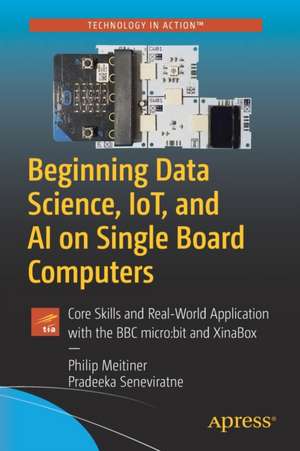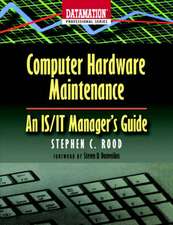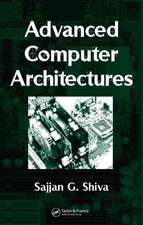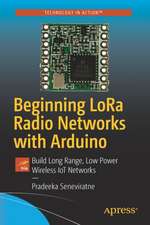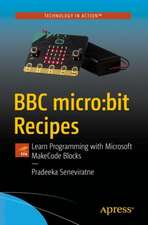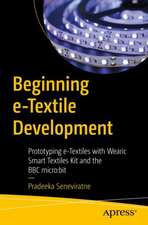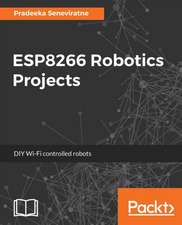Beginning Data Science, IoT, and AI on Single Board Computers: Core Skills and Real-World Application with the BBC micro:bit and XinaBox
Autor Philip Meitiner, Pradeeka Seneviratneen Limba Engleză Paperback – 18 iul 2020
Learn to use technology to undertake data science and to leverage the Internet of Things (IoT) in your experimentation. Designed to take you on a fascinating journey, this book introduces the core concepts of modern data science. You'll start with simple applications that you can undertake on a BBC micro:bit and move to more complex experiments with additional hardware. The skills and narrative are as generic as possible and can be implemented with a range of hardware options.
One of the most exciting and fastest growing topics in education is data science. Understanding how data works, and how to work with data, is a key life skill in the 21st century. In a world driven by information it is essential that students are equipped with the tools they need to make sense of it all. For instance, consider how data science was the key factor that identified the dangers of climate change -- and continues to help us identify and react to the threats it presents. This book explores the power of data and how you can apply it using hardware you have at hand.
You'll learn the core concepts of data science, how to apply them in the real world and how to utilize the vast potential of IoT. By the end, you'll be able to execute sophisticated and meaningful data science experiments - why not become a citizen scientist and make a real contribution to the fight against climate change.
There is something of a digital revolution going these days, especially in the classroom. With increasing access to microprocessors, classrooms are are incorporating them more and more into lessons. Close to 5 million BBC micro:bits will be in the hands of young learners by the end of the year and millions of other devices are also being used by educators to teach a range of topics and subjects. This presents an opportunity: microprocessors such as micro:bit provide the perfect tool to use to build 21st century data science skills. Beginning Data Scienceand IoT on the BBC micro:bit provides you with a solid foundation in applied data science.
One of the most exciting and fastest growing topics in education is data science. Understanding how data works, and how to work with data, is a key life skill in the 21st century. In a world driven by information it is essential that students are equipped with the tools they need to make sense of it all. For instance, consider how data science was the key factor that identified the dangers of climate change -- and continues to help us identify and react to the threats it presents. This book explores the power of data and how you can apply it using hardware you have at hand.
You'll learn the core concepts of data science, how to apply them in the real world and how to utilize the vast potential of IoT. By the end, you'll be able to execute sophisticated and meaningful data science experiments - why not become a citizen scientist and make a real contribution to the fight against climate change.
There is something of a digital revolution going these days, especially in the classroom. With increasing access to microprocessors, classrooms are are incorporating them more and more into lessons. Close to 5 million BBC micro:bits will be in the hands of young learners by the end of the year and millions of other devices are also being used by educators to teach a range of topics and subjects. This presents an opportunity: microprocessors such as micro:bit provide the perfect tool to use to build 21st century data science skills. Beginning Data Scienceand IoT on the BBC micro:bit provides you with a solid foundation in applied data science.
What You'll Learn
· Use sensors with a microprocessor to gather or "create" data
· Extract, tabulate, and utilize data it from the microprocessor
· Connect a microprocessor to an IoT platform to share and then use the data we collect
· Analyze and convert data into information
Who This Book Is For
Educators, citizen scientists, and tinkerers interested in an introduction to the concepts of IoT and data on a broad scale.
· Use sensors with a microprocessor to gather or "create" data
· Extract, tabulate, and utilize data it from the microprocessor
· Connect a microprocessor to an IoT platform to share and then use the data we collect
· Analyze and convert data into information
Who This Book Is For
Educators, citizen scientists, and tinkerers interested in an introduction to the concepts of IoT and data on a broad scale.
Preț: 367.48 lei
Preț vechi: 459.34 lei
-20% Nou
Puncte Express: 551
Preț estimativ în valută:
70.32€ • 73.61$ • 58.18£
70.32€ • 73.61$ • 58.18£
Carte disponibilă
Livrare economică 15-29 martie
Preluare comenzi: 021 569.72.76
Specificații
ISBN-13: 9781484257654
ISBN-10: 1484257650
Pagini: 300
Ilustrații: XIII, 316 p. 166 illus., 158 illus. in color.
Dimensiuni: 155 x 235 mm
Greutate: 0.47 kg
Ediția:1st ed.
Editura: Apress
Colecția Apress
Locul publicării:Berkeley, CA, United States
ISBN-10: 1484257650
Pagini: 300
Ilustrații: XIII, 316 p. 166 illus., 158 illus. in color.
Dimensiuni: 155 x 235 mm
Greutate: 0.47 kg
Ediția:1st ed.
Editura: Apress
Colecția Apress
Locul publicării:Berkeley, CA, United States
Cuprins
Chapter 1: Introduction to Data Science in the Classroom.- Chapter 2: Data Science Goes Digital.- Chapter 3: Experimenting with Weather.- Chapter 4: Working with Large Data Sets.- Chapter 5: Introduction to Data Analysis.- Chapter 6: Introducing IoT to Data Science.- Chapter 7: Using Bluetooth for Data Science.- Chapter 8: Investigating the micro:bit Radio.- Chapter 9: Using WiFi to connect to the Internet.- Chapter 10: Introduction to Machine Learning and Artificial Intelligence.- Chapter 11: Using ML services.- Chapter 12: Connecting an edge device to the IoT application.- Chapter 13: Consolidating our Learnings.
Notă biografică
Pradeeka Seneviratne, a graduate from the Sri Lanka Institute of Information Technology (SLIIT), has almost two decades of experience working on large and complex IT projects related to the industrial world in a variety of fields, in a variety of roles (programmer, analyst, architect, and team leader) with different technologies and software. Pradeeka has also authored several books related to the maker category including Beginning BBC micro:bit (Apress), Beginning LoRa Radio Networks with Arduino (Apress) and Building Arduino PLCs (Apress).
Philip Meitiner has a background in applied mathematics, psychology, market research, and ed-tech. Philip was was on the original founding members of the Micro:bit Education Foundation where he helped establish the Foundation and is responsible for creating and nurturing the ecosystem, building the reseller and peripheral network and managing the sponsorship scheme (which sawmore than 30,000 micro:bits donated to disadvantaged schools in 55 counties). Philip continues to work in the ed-tech sector as a consultant providing services to companies involved with micro:bit. This eclectic mix of careers and experience has instilled in Philip a deep understanding of what it is like to embark on a new learning journey. In addition, his experiences in teaching, market research and IT have given him the perfect mix of skills and knowledge necessary to craft this book.
Textul de pe ultima copertă
Learn to use technology to undertake data science and to leverage the Internet of Things (IoT) in your experimentation. Designed to take you on a fascinating journey, this book introduces the core concepts of modern data science. You'll start with simple applications that you can undertake on a BBC micro:bit and move to more complex experiments with additional hardware. The skills and narrative are as generic as possible and can be implemented with a range of hardware options.
One of the most exciting and fastest growing topics in education is data science. Understanding how data works, and how to work with data, is a key life skill in the 21st century. In a world driven by information it is essential that students are equipped with the tools they need to make sense of it all. For instance, consider how data science was the key factor that identified the dangers of climate change -- and continues to help us identify and react to the threats it presents. This book explores the power of data and how you can apply it using hardware you have at hand.
You'll learn the core concepts of data science, how to apply them in the real world and how to utilize the vast potential of IoT. By the end, you'll be able to execute sophisticated and meaningful data science experiments - why not become a citizen scientist and make a real contribution to the fight against climate change.
There is something of a digital revolution going these days, especially in the classroom. With increasing access to microprocessors, classrooms are are incorporating them more and more into lessons. Close to 5 million BBC micro:bits will be in the hands of young learners by the end of the year and millions of other devices are also being used by educators to teach a range of topics and subjects. This presents an opportunity: microprocessors such as micro:bit provide the perfect tool to use to build 21st century data science skills. Beginning Data Science and IoTon the BBC micro:bit provides you with a solid foundation in applied data science. You will:
One of the most exciting and fastest growing topics in education is data science. Understanding how data works, and how to work with data, is a key life skill in the 21st century. In a world driven by information it is essential that students are equipped with the tools they need to make sense of it all. For instance, consider how data science was the key factor that identified the dangers of climate change -- and continues to help us identify and react to the threats it presents. This book explores the power of data and how you can apply it using hardware you have at hand.
You'll learn the core concepts of data science, how to apply them in the real world and how to utilize the vast potential of IoT. By the end, you'll be able to execute sophisticated and meaningful data science experiments - why not become a citizen scientist and make a real contribution to the fight against climate change.
There is something of a digital revolution going these days, especially in the classroom. With increasing access to microprocessors, classrooms are are incorporating them more and more into lessons. Close to 5 million BBC micro:bits will be in the hands of young learners by the end of the year and millions of other devices are also being used by educators to teach a range of topics and subjects. This presents an opportunity: microprocessors such as micro:bit provide the perfect tool to use to build 21st century data science skills. Beginning Data Science and IoTon the BBC micro:bit provides you with a solid foundation in applied data science. You will:
- · Use sensors with a microprocessor to gather or "create" data
· Extract, tabulate, and utilize data it from the microprocessor
· Connect a microprocessor to an IoT platform to share and then use the data we collect
· Analyze and convert data into information
Caracteristici
Gain a solid foundation of key concepts for the data science field and shows readers how to apply them using simple technology Connect to IoT platforms and use them to understand how to work with data through this text aimed at non-technical readers Develop skills that lead to tangible ways to have an impact on climate change and climate action
